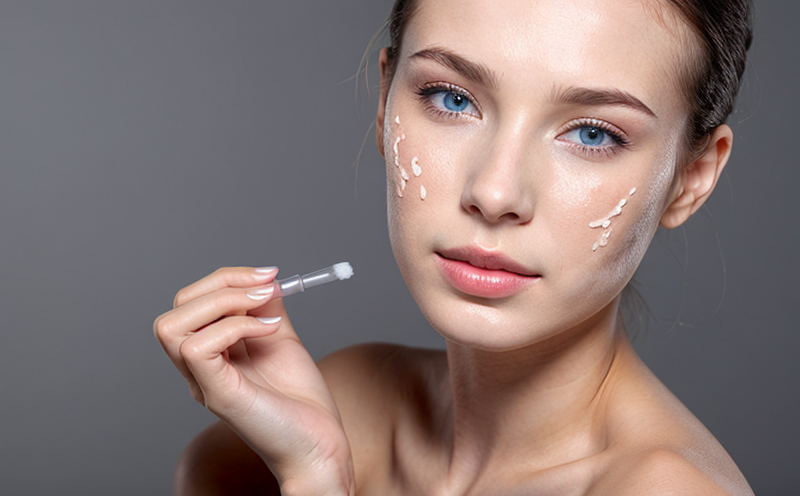Human Clinical Irritation Testing of Cosmetic Creams
In the realm of cosmetics testing, human clinical irritation testing holds a pivotal role in ensuring product safety and compliance with regulatory standards. This service is particularly crucial for cosmetic creams due to their direct contact with the skin, which can trigger various forms of irritant reactions or allergic sensitization. The primary objective of this testing is to identify potential allergens or irritants that could cause adverse effects on consumers.
Human clinical irritation testing involves recruiting a panel of volunteers who apply the cosmetic cream under controlled conditions and are monitored for any signs of skin irritation over a specified period. This process allows for the identification of substances that may induce redness, swelling, itching, or even more severe reactions like blistering. The test is conducted in accordance with international standards such as ISO 10993-18 and ASTM F854.
Specimen preparation plays a critical role in this testing process. Cosmetics are typically applied to the skin of the forearm, back, or abdomen for observation. The selected area must be free from any existing conditions that could affect the outcome. Volunteers are instructed to apply the cream as they would use it during everyday life. Post-application, they are observed at regular intervals over a period ranging from 24 hours to several days, depending on the product type and the nature of the test.
Instrumentation used in this process includes skin cameras for photographic documentation of any adverse reactions and dermatological equipment such as biopsies or patch tests. The data collected is meticulously recorded and analyzed by our team of experts to determine the safety profile of the cosmetic cream under scrutiny. Reporting standards follow international protocols, ensuring that all findings are transparent, reproducible, and actionable.
This testing service not only helps in safeguarding consumer health but also aids manufacturers in improving their product formulations. By identifying potential irritants early in the development process, companies can make informed decisions to enhance product safety and efficacy. This aligns with broader industry trends towards more robust quality assurance practices and increased transparency in cosmetic manufacturing.
The results of human clinical irritation testing are invaluable for regulatory compliance and brand reputation. They provide a scientific basis for claims made about the safety of cosmetic products, supporting trust between manufacturers and consumers. Furthermore, these tests contribute significantly to reducing the number of adverse reactions reported post-launch, thereby enhancing customer satisfaction and loyalty.
Understanding the context within the sector, human clinical irritation testing is essential for ensuring that cosmetics meet stringent quality control measures and regulatory requirements. This service is particularly relevant in today's competitive market where brand reputation and consumer trust are paramount.
Industry Applications
- New Product Development: Identifying potential allergens or irritants early helps in refining product formulations to meet safety standards.
- R&D Support: Assists research and development teams in optimizing formulas based on real-world data from human clinical testing.
- Regulatory Compliance: Ensures that products adhere to international standards, facilitating market entry into various jurisdictions.
- Quality Assurance: Validates the safety of cosmetic creams before they reach retail shelves, protecting both consumers and manufacturers.
- Retailer Requirements: Meets stringent criteria set by major retailers for product certification and shelf placement.
- Cosmetic Brand Reputation: Enhances brand image by demonstrating a commitment to consumer safety and well-being.
International Acceptance and Recognition
The human clinical irritation testing of cosmetic creams is widely accepted and recognized across the globe. Regulatory authorities such as the European Union, United States Food and Drug Administration (FDA), and Health Canada mandate this form of testing to ensure that cosmetics are safe for use by the general public.
ISO 10993-18 provides a comprehensive framework for conducting human clinical irritation tests on cosmetic products. This standard outlines detailed protocols regarding specimen preparation, application methods, observation times, and data analysis techniques. Compliance with these standards is crucial not only to meet regulatory requirements but also to gain acceptance in international markets.
The European Union's Cosmetics Regulation (EC 1272/2006) specifically requires that all cosmetic products intended for sale within the EU undergo such testing. Similarly, the FDA mandates this procedure as part of its cosmetics regulation and safety measures. These regulations underscore the importance of human clinical irritation testing in ensuring product safety.
Recognition from these regulatory bodies extends beyond mere compliance; it also fosters trust among consumers who are increasingly aware of the potential risks associated with cosmetic products. By adhering to stringent testing protocols, manufacturers can ensure that their products meet the highest standards of quality and safety, thereby enhancing consumer confidence in their brands.
The international acceptance and recognition of human clinical irritation testing underscore its significance in the global cosmetics industry. Manufacturers who invest in this service not only comply with legal requirements but also position themselves as leaders in product safety and innovation.
Environmental and Sustainability Contributions
Human clinical irritation testing contributes positively to environmental sustainability by promoting the development of safer cosmetic products that minimize adverse effects on consumers. By identifying potential allergens or irritants early in the formulation process, this service helps reduce the need for post-market recalls, which can lead to significant waste generation and resource depletion.
The reduction of adverse reactions also translates into lower healthcare costs and increased productivity among users of cosmetic products. This, in turn, supports broader societal well-being and economic stability. Additionally, by ensuring that only safe products reach the market, this service promotes responsible consumption patterns that are aligned with sustainable development goals.
Manufacturers who adopt human clinical irritation testing as part of their quality assurance processes contribute to a more sustainable industry ecosystem. This approach not only enhances consumer trust but also fosters innovation in product design and formulation, leading to environmentally friendly solutions that align with global sustainability initiatives.
The commitment to environmental responsibility through rigorous testing practices is a testament to the ethical standards upheld by reputable laboratories. By prioritizing safety and efficacy, these laboratories play a crucial role in driving positive change within the cosmetics sector.





